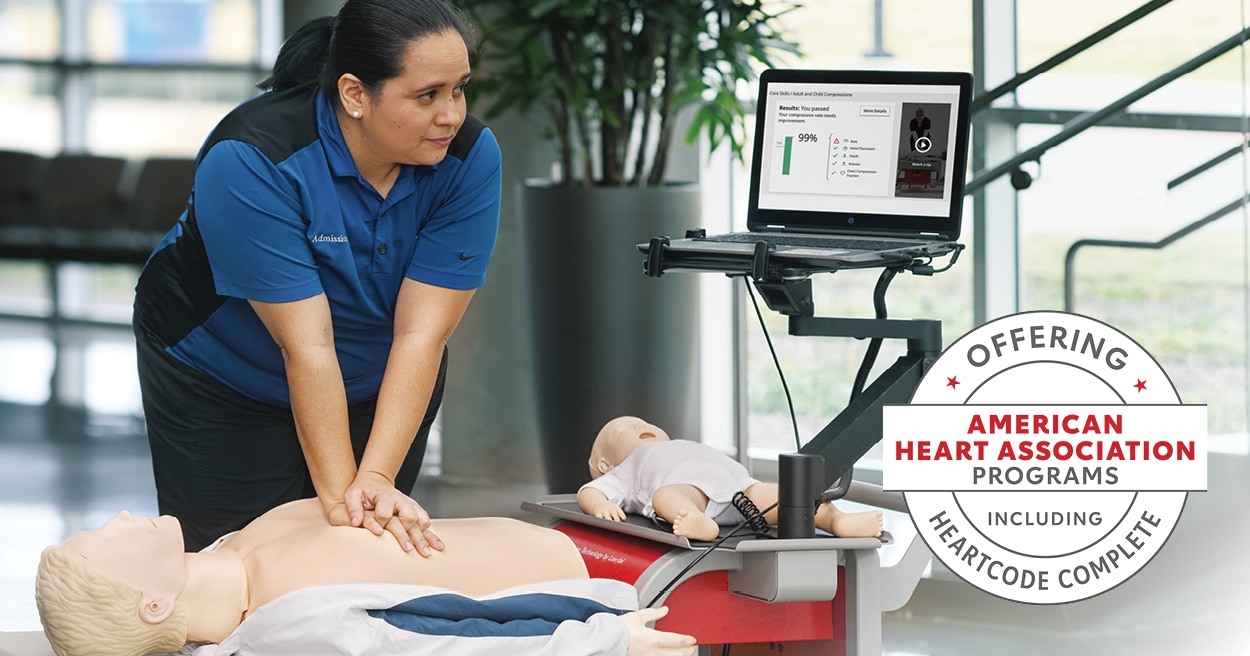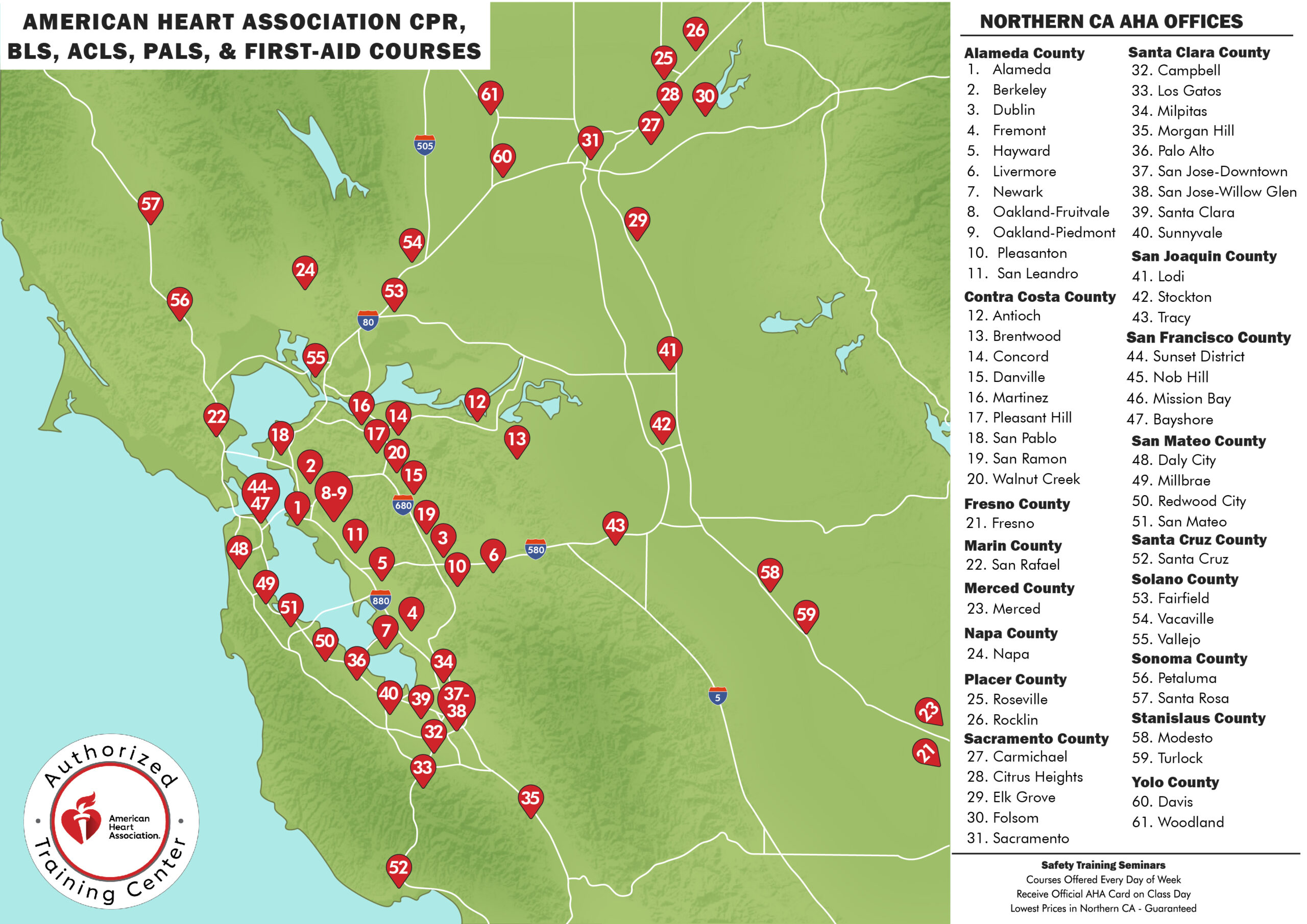American Heart Association© BLS CPR Certification Classes in Pleasant Hill

BLS CPR classes in Pleasant Hill
Course Name: BLS CPR Provider Heartcode (Initial or Renewal)
Online Course Length: 1-2 hours (At your home.)
Skills Testing: 40-60 minutes (At one of our over 60 CPR testing sites.)
Description: CPR (adult, children, & infant), 2 person CPR, AED, bag valve mask
Price: $120 (This includes the online BLS course, skills testing, and card.)
Certification: American Heart Association© BLS certification card.
When: BLS classes are offered Monday – Sunday from 7 am to 6 pm
Card Issuance: You will receive the card on day of class.
Add ons available: ACLS, PALS, First-aid, Opioid, or Bloodborne Pathogens
Low Price Guarantee: Lowest prices in Northern CA. Price matching policy.
View BLS Courses in Pleasant Hill & Other Cities Near You
Store locator is loading from StoreRocket Store Locator App..

Empowering Communities: American Heart Association BLS CPR Classes in Pleasant Hill
In the serene enclave of Pleasant Hill, nestled within the vibrant East Bay region of California, the importance of life-saving skills cannot be overstated. Amidst the tranquility of suburban life, emergencies can arise unexpectedly, underscoring the critical need for individuals trained in cardiopulmonary resuscitation (CPR). Enter the American Heart Association (AHA) Basic Life Support (BLS) CPR classes, a beacon of preparedness and empowerment for residents of Pleasant Hill and beyond. In this comprehensive guide, we delve into the significance of AHA BLS CPR classes in Pleasant Hill, exploring their transformative impact on participants, families, and the broader community.
Essence of AHA BLS CPR Classes
American Heart Association BLS CPR classes are designed to equip individuals with the knowledge, skills, and confidence to respond effectively in cardiac emergencies. Led by certified instructors, these classes cover essential techniques for CPR, including chest compressions, rescue breaths, and the use of automated external defibrillators (AEDs). Participants learn how to recognize the signs of cardiac arrest, initiate CPR promptly, and coordinate care until professional medical help arrives.
The curriculum of AHA BLS CPR classes emphasizes hands-on training, simulation-based learning, and real-world scenarios to ensure participants develop proficiency in life-saving techniques. Whether healthcare professionals, first responders, or laypersons, individuals of all backgrounds benefit from the comprehensive training offered by AHA BLS CPR classes.
Empowering Participants as First Responders
For participants in Pleasant Hill, AHA BLS CPR classes represent more than just a training session; they are a gateway to becoming empowered first responders. Whether at home, in the workplace, or in public settings, individuals trained in BLS CPR are equipped to intervene effectively in cardiac emergencies, potentially saving lives in the process.
Through hands-on practice and scenario-based simulations, participants develop the skills and confidence to perform high-quality CPR when it matters most. By mastering the techniques of chest compressions, rescue breaths, and AED use, participants emerge from AHA BLS CPR classes ready to make a difference in the lives of those in need.
Enhancing Workplace Safety and Preparedness
In addition to empowering individuals, AHA BLS CPR classes play a crucial role in enhancing workplace safety and preparedness in Pleasant Hill. Many industries and organizations require employees to undergo BLS CPR certification as part of their occupational health and safety protocols.
By ensuring that employees are trained and certified in BLS CPR, employers demonstrate their commitment to employee well-being and workplace safety. In the event of a medical emergency or cardiac arrest at the workplace, certified employees can provide immediate assistance, potentially saving lives and mitigating the severity of injuries.
Fostering Community Resilience
Beyond the workplace, AHA BLS CPR classes contribute to fostering community resilience in Pleasant Hill. Local organizations, community centers, and healthcare providers collaborate to offer CPR training to residents, volunteers, and community leaders.
By equipping a diverse cross-section of the community with life-saving skills, AHA BLS CPR classes create a network of trained responders capable of mobilizing during emergencies. Whether at home, in schools, or in public spaces, individuals trained in BLS CPR serve as critical links in the chain of survival, enhancing the community’s overall resilience and preparedness.
Conclusion
As Pleasant Hill continues to evolve and grow, the importance of AHA BLS CPR classes remains steadfast. By investing in the training and education of its residents, Pleasant Hill lays the foundation for a safer and more resilient future.
Through ongoing collaboration, innovation, and a shared commitment to community well-being, AHA BLS CPR classes serve as a beacon of hope and preparedness, empowering individuals to become everyday heroes in times of need.
In conclusion, AHA BLS CPR classes in Pleasant Hill are not just training sessions; they are opportunities for individuals to acquire life-saving skills and make a tangible difference in their community. As we look towards the future, let us embrace the transformative power of AHA BLS CPR classes as catalysts for positive change and guardians of life.
FAQs
Who should attend BLS CPR classes in Pleasant Hill?
BLS CPR classes are suitable for a wide range of individuals, including healthcare professionals, educators, childcare providers, and members of the general public who want to be prepared to respond to cardiac emergencies.
How long does it take to complete a BLS CPR class?
The duration of BLS CPR classes in Pleasant Hill typically ranges from four to six hours, depending on the specific course provider and format. Some providers may offer accelerated options for individuals with prior CPR training.
Is BLS CPR certification valid nationwide?
Yes, BLS CPR obtained in Pleasant Hill is valid nationwide. The certification is issued by the American Heart Association and is recognized by healthcare organizations, employers, and regulatory bodies across the United States.
